|
Diridaru Piyasa a base for people with special needs:
Treading softly with Down’s Syndrome
They all seemed equally engrossed in their work. Danangi, one of the
students of Diridaru Piyasa, was practising her sewing skills on
cardboard with a shoe lace.
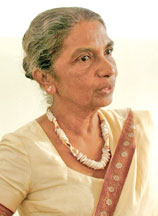 |
|
Miranda Hemalatha |
|
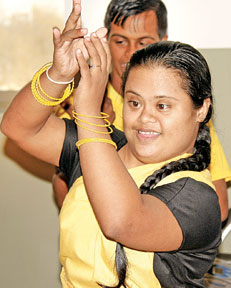 |
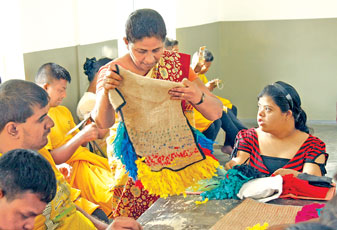 |
|
Assistant Indrani
training students |
“The safety of the children is a priority”, explained Miranda. “We
never let children use fire or sharp objects unsupervised, before they
are entirely capable of handling them on their own.
“Two assistants of Miranda Hemalatha’s were teaching the children on
handicrafts. Sandamali, another student, was kind enough to demonstrate
the method of making a door mat, ‘making carpet’ as she puts it.
Although her actions did not give away the fact that she is suffering
from Down’s Syndrome.
Diridaru Piyasa is run by Miranda Hemalatha Kala Ashramaya. The
beautiful piece of architecture designed by the Clove Foundation based
on Miranda Hemalatha’s advice was funded by MJF Foundation, consist of
office room, music room, dancing room, computer room, library, staff
restrooms, sick room, administration office, storage spaces, carpentry
room, separate female and male bathrooms and changing rooms for
students, attached bathrooms for office.
It is clear that the whole building has been designed to economise
funds, time and energy, also keeping in mind the needs of its students.
Their routine work starts at 9.30 am, with vocational training for
students above 14, from 3.30 pm to 5.30 pm pre school for those who are
to attend school.
On Saturday from 9.30 am to 5.00 pm to accommodate outstation
students who are unable to come to school on week days. All classes are
conducted free while doctors have volunteered to conduct clinics once a
month. Children requiring further treatment are referred to a hospital.
Remedial teaching
Miranda’s many years of experience working in the Primary Committee,
Curriculum Development Unit, Ministry of Education has helped her in
working with special children.
“I use the kind of remedial teaching that we used on backward,
problem children or slow learners in normal classes. Unfortunately these
methods are slowly diminishing from the school system.”
According to Miranda working with children with special emotional
needs is not an easy task. “These children are emotional and have
difficulty in expressing. They need to engage in activities that would
provide them an outlet to let out their pent up feelings” explained
Miranda.
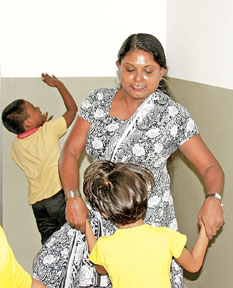 |
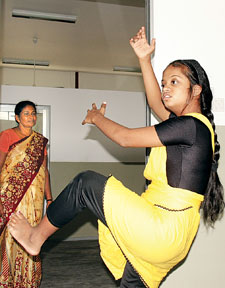 |
| Kumudini Thushari |
Indrani Jayatillake
with student Danangi |
They have introduced various activities to release their bottled up
emotional frustration as well as physical energy.
“This is the best ways to deal with boisterous children. This way
they become more physically controlled.” Although occasional outbursts
may take place, to this day Miranda and her staff has not turned a child
away.
Dancing and music play a major role in relieving emotional and
physical pressure in them, she said. Moreover, dancing develops the
psychomotor of a person. Once hand to brain coordination is developed it
is easier to engage them in more work that facilitates growth of their
brain cells.
Once the meanings of various songs are explained it, enhances their
vocabulary. “We have observed that they actually use words and phrases
they derive from these lyrics in their day-to-day life”, said Miranda.
Dancing also helps children with Down’s Syndrome to deal with their
balance problem.
Training them to dance while making use of limited space helps them
to grasp complex mathematical concepts such as concepts of space,
explained Miranda. Special lessons on expressions help them to transform
their facial muscles.
Dancing
Although dancing helps them in their therapy Miranda realised just
training them to dance would not make them independent. Consequently she
moved on to vocational training. Diridaru Piyasa now has vocational
training courses on carpentry, masonry, agriculture and sewing.
Two of her students are currently employed. A boy is now working as a
tailor. She explained that the boy who came to her when he was 15 just
stood by her like a log.
By the time he left Miranda’s care he was able to read the grade
three text book, count, subtract and multiply up to 50, take his mother
shopping on the push bicycle and use the sewing machine.
Another students of her’s Nadeeka, the first person with Down’s
Syndrome to have a solo performance - is now a dance teacher in a
leading school in Colombo.
Miranda requested from their potential employers to be understanding
and appreciate their efforts and also treat them with love, care and
cooperation.
Till the students are independent they are trained in everything from
getting dressed, cleaning, cooking, eat what they have cooked, answering
the phone and taking a message, and their toilet habits. She explained,
that the training is not based on theory but practice. “I prefer the
word training to teaching,” she explained.
“They need to be drilled until an activity is engraved in their
memory and once it gets stuck in their mind there is no taking it out.”
Although Miranda and her staff are training them on how to react to
sexual advances she is wary about creating opposite sex phobia.
|
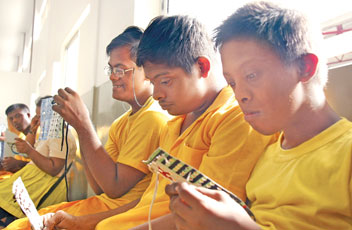 |
|
Making door mats |
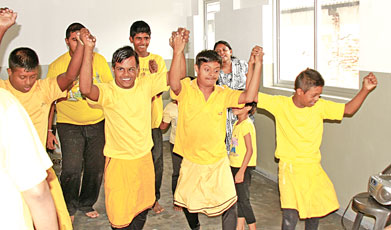 |
|
Dancing lession |
|
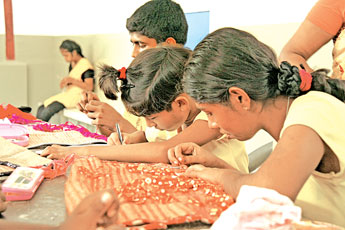 |
As she explained some of her students are capable of leading a happy
married life and training them to avoid sexual advances would deprive
them of that opportunity.
Miranda who is totally against male-female segregation, of even
normal children, said that children with Down’s syndrome are fully
capable of handling their emotions about the opposite sex.
Miranda’s work with children with Down’s syndrome runs far back as
year 2000. It took her six months just to make friends with the two
children that she enrolled in her dance class for other children. “It’s
the same with these children” said Miranda.
“They take time to open up to you. Only afterward can we move on to
other activities.” She explained her first experience of how one of her
students - a fourteen year old boy - used to wet his pants, strip his
clothes and yell. “But I always tolerated his behaviour,” said Miranda.
As a result most of her other students were pulled out of the class
by concerned parents. She pleaded with the parents not to do so because
she strongly believed that the children with the Down’s syndrome stood a
better chance at adapting themselves if they mingled with other
children.
Miranda made the country cry with Diriya Narthana in 2004, a concert
performed by children with Down’s Syndrome.
We were swamped with phone calls for months afterward, by parents
from every corner of the country, requesting us to work with their
children suffering from Down’s Syndrome,” said Miranda. She explained
that it was only then that children with Down’s Syndrome started getting
some respect. Until then they were marginalised by the society. “I never
went looking for this” she said. “I was actually forced into this.”
And her luck changed for the better once again with the solo
performance of 10-year-old, Danangi Fernando. It was this performance
that made the Chairman of MJF foundation, Merrill J Fernando, to fund
the school building in a land provided by the Foundation itself.
Miranda hopes to build a dormitory in a land of over one acre at
Kindelpitiya - a 10 minute drive from the school - which was donated to
her cause, because of her untiring efforts.
“We have received hundreds of requests from outside Colombo, but we
have no way of accommodating them because we lack dormitories”, said
Miranda regretfully. Miranda Hemalatha requests any interested party to
take up the task of constructing the dormitories.
She pointed out that charity for people with Down’s Syndrome is
worthwhile due to several reasons. “Down’s Syndrome has very little to
do with late pregnancies or genetics anymore,” said Miranda.
“It’s a mere result of alcoholism, environmental pollution and above
all stress.” She said, millions of people waste money on alcohol and
drugs that could be put to better use if they spent it on such charity.
“People are under stress, specially educated professionals” in fact
she revealed that most of the students who attend her school are
children of educated professionals. She vehemently denounced the many
misconceptions that existed regarding children with Down’s Syndrome.
There was a time when they were kept indoors and shunned by the rest
of the society. She pointed out that the new global trend in performing
abortions would be totally against the Buddhist principles.
As long as the parents are alive they will be taken care of but what
will happen when they die? Will a hired caretaker be as loving and
caring? A host of problems awaited the unprepared.
She plans to develop the site later at Kindelpitiya into a village
for people with Down’s Syndrome, where they could have their own way of
life, their own entertainment, she explained.
“People trained in vocations could go to work and come back to their
own ‘home’.” She said that trained professionals would be assigned to
new arrivals at the dormitory, till they are self sufficient. Her dream
is to turn them into independent individuals like Nadeeka.
Assistants Kumudini Thushari and Indrani Jayatillake are fully
capable of handling any emergency that would arise while working with
children with special needs.
According to Kumudini parents often see a difference in their
children after they attend this one of a kind activity school. Kumudini
who has been working with Miranda since she graduated from the
University of Visual and Performing Arts, now has qualms about leaving
her beloved students.
“It’s a tough job that requires a lot of patience”, said Kumudini.
“But it’s rewarding, besides the children have got so close to me.”
“They are the most genuine people I know”, said Miranda, referring to
the students.
“If you love them, they will love you with all their hearts. If you
hate them you will never be able to get them to love you.”
By birth they are incapable of hypocrisy, which may seem, at times, a
prerequisite for survival in such a cruel world. Such people, whether
suffering from Down’s Syndrome or not, are often taken advantage of by
society.
Diridaru Piyasa appeals for funds.
Pix: Kavindra Perera
|

